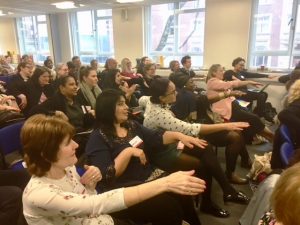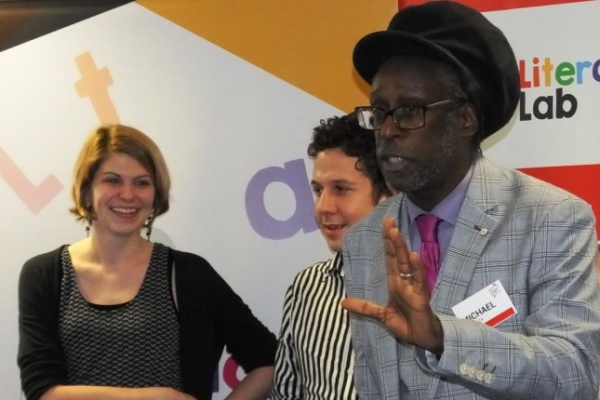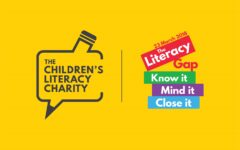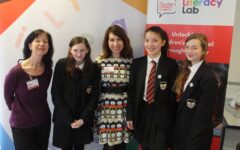Michael de Souza, creator of hugely popular crime-busting rodent Rastamouse, certainly knows how to reel in his crowd. Within seconds of taking to the floor at our first ever education conference, ‘The Literacy Gap’, he had our audience of 90 delegates moving, shaking and chanting smile-raising rhymes such as the crazy crocodile.
Why? For Michael, when it comes to inspiring a love of literacy, an infectious enthusiasm is non-negotiable. “You need to be enthused by learning and storytelling if you are going to engage and enthuse children,” he says.
Taking place earlier this year, our first ever education conference sought to highlight the literacy gap that exists for so many children, with those from disadvantaged backgrounds struggling the most. In England, 1 in 5 children leaves primary school without reaching expected levels in reading and writing, a figure which rises to 1 in 3 for those from lower socio-economic backgrounds. As Rastamouse might say, addressing this problem is ‘crucial’.
With the tagline ‘Know It. Mind It. Close it’, the conference sought to give our audience of teachers, head teachers, school SENCOs, youth leaders and other interested parties a detailed picture of the literacy gap in the UK today, and equip them with ways to support children who are facing barriers.

Alongside keynote speaker Michael de Souza, our roster of illustrious guest speakers included Sir Jim Rose, who reflected on the impact of the wide-scale introduction phonics, Dr Jenny Thomson, from the University of Sheffield, who shared advice about supporting children with EAL, and Matt Hood, CEO of The Institute of Teaching, who outlined ways to develop best practice in literacy teaching in schools.
As well as enticing rhymes, participants went away with plenty of practical ideas to help fuel a love of literacy learning. The Ministry of Stories revealed how songwriting can be a brilliant avenue for helping children tap into their writing talent, Paul Johnson introduced us to the fascinating world of book art with an interactive book-making activity, while the Empathy Lab demonstrated how stories can help children explore feelings and consider alternative perspectives.
Some of our youngest speakers were students from The Knights Templar School in Hertfordshire who explained how our peer-to-peer Reader Leader scheme has been a huge success for Readers and Leaders alike. The conference also provided delegates with the chance to suggest ways in which we as a charity could offer further support and develop our work. Key messages included the demand for opportunities to observe our one-to-one Literacy Lab interventions in action, for guidance on how to set up peer-to-peer reading schemes and for recommendations on how after-school Community Literacy Labs could work. We really value this feedback and will use it to inform our future activities. Thank you to everyone who made the conference such a success!
Interested in setting up a Literacy Lab at your school? Find out how!



